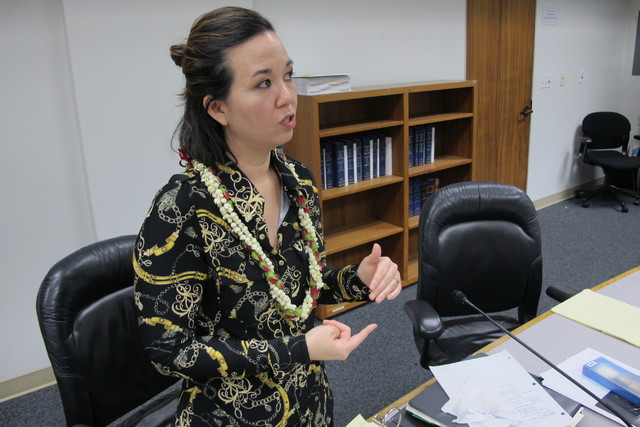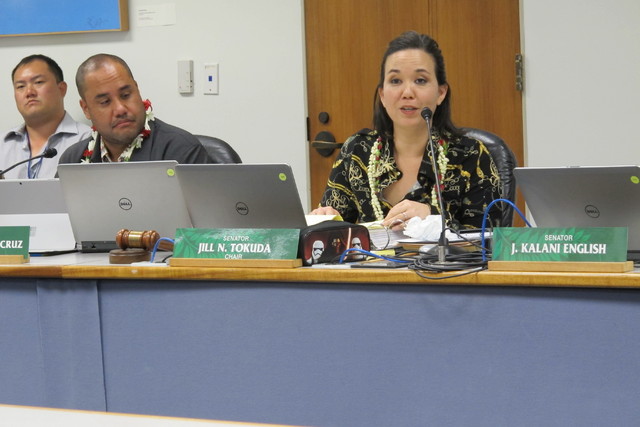HONOLULU — Hawaii senators are pushing a state budget that directs more money to affordable housing and homelessness programs, putting more funding behind their commitment to address those problems than their colleagues in the House. ADVERTISING HONOLULU — Hawaii senators
HONOLULU — Hawaii senators are pushing a state budget that directs more money to affordable housing and homelessness programs, putting more funding behind their commitment to address those problems than their colleagues in the House.
They also restored $6 million in state funding for the Preschool Open Doors program, which subsidizes preschool for low- and moderate-income families.
Senators also want to fund 33 new vector-control positions in the Department of Health to fight the mosquitoes that can carry dengue fever or the Zika virus, which would restore that department’s staffing to pre-recession levels, said Sen. Jill Tokuda, chairwoman of the Committee on Ways and Means.
“I can’t emphasize enough our vector control needs to control Zika,” said Virginia Pressler, director of the state Department of Health, calling mosquito control a key agenda for the state.
The Senate budget proposal would spend $29 billion over two years, down from Gov. David Ige’s proposed $30.7 billion. The Senate Committee on Ways and Means approved the bill unanimously Tuesday. The bill goes next to the full Senate, where it’s expected to be approved, and then the House and Senate will work out their differences in conference committee meetings.
The committee agreed to Ige’s request on Monday to increase funding for the Department of Hawaiian Home Lands to $17.1 million in 2016 and $23.5 million in 2017, up from the $9.6 million annual appropriation. There were more than 27,600 people on a waiting last year for land leases awarded to Hawaiians by the department.
“We cannot lose focus on what is most important, and that is that we attack the list, we get services to our beneficiaries, we get them off the list, we get them into homes, we get them on the land,” Tokuda said.
Dozens of residents, nurses and doctors packed the hearing room to ask for money for Wahiawa General Hospital, a nonprofit hospital that serves about one-third of the island’s residents including central Oahu and the North Shore. Its CEO Don Olden told the committee the hospital might have to close in six to nine months without an infusion of cash.
Marian Chow, 83, said she died and was brought back to life at the hospital after internal bleeding twice.
“It’s the heart of Wahiawa,” Chow said. “Most of us were born there, we’ve been there for sicknesses and injuries, we’ve watched our parents go there and pass away. It’s a cycle that keeps going on and on. The cycle of life. To see the hospital not be able to function as the cycle of life is heartbreaking.”
Sen. Donovan Dela Cruz, who represents Wahiawa and serves as vice chairman of the committee, proposed that the state could buy the hospital’s two parking lots for $5 million, and then lease the lots back to the hospital for a nominal fee. “That would allow some financial assistance and cash infusion quickly,” Dela Cruz said.
The committee doubled the amount that the House had allocated for the Rental Housing Revolving Fund, which goes to the development of affordable rentals, to $50 million, which still falls below Ige’s request of $75 million. The Senate upped funding for the Dwelling Unit Revolving Fund, which is for developing affordable homes for purchase, to $33 million, surpassing Ige’s request for $35 million.
“We’ve got to keep up with the rate of housing needs,” Dela Cruz said.
The committee also restored $3 million in funding for Housing First, a program that helps chronically homeless people; $2 million for rapid rehousing, which provides short-term rental subsidies; and $1.1 million for homeless outreach programs, all of which had been zeroed out in the House version of the budget.
“We feel that homelessness is not something that will go away next year,” Tokuda said. “It would be outstanding if it was a temporary thing. But this is an issue that will be ongoing, that needs to be supported by putting it in the budget.”





